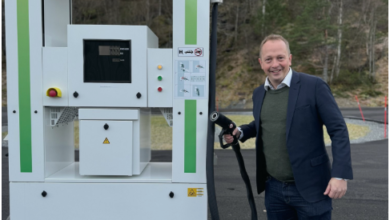HyCET research project to develop hydrogen trucks
HyCET develops and tests hydrogen trucks with combustion engines for transport logistics.

The German Federal Ministry for Digital and Transport (BMDV) approved the funding application for the consortium research project HyCET (Hydrogen Combustion Engine Trucks) led by the BMW Group.
The other HyCET project partners are DEUTZ AG, DHL Freight GmbH, KEYOU GmbH, TotalEnergies Marketing Deutschland GmbH and Volvo Group.
The research project aims to demonstrate the sustainability potential of trucks with hydrogen combustion engines for transport logistics. The other issue for HyCET, alongside technology development, is the required infrastructure, such as publicly accessible hydrogen filling stations. Thanks to its shorter filling times, high payload and versatility, and attractive range, hydrogen is a promising fuel for transport logistics.
The HyCET research project will have an investment volume of 19.5 million euros, of which 11.3 million euros will be funded by the Federal Ministry for Digital and Transport (BMDV). Throughout the HyCET project, the BMDV also provided €5.7 million in funding for constructing two public hydrogen filling stations, mainly for heavy goods traffic.
The network has set ambitious targets for the four-year project. The aim is to develop two 18-tonne trucks and two 40-tonne trucks with hydrogen combustion engines that will be tested in regular BMW Group and DEUTZ transport logistics. Two new hydrogen filling stations, including for heavy utility vehicles, will be built in Leipzig and Nuremberg to facilitate the daily operation of these trucks.
BMW Group defines key requirements for later introducing hydrogen-powered trucks into its transport logistics. As the consortium leader, it also sets the framework for successful project implementation. It is managing the pilot deployment of an 18-tonne truck at BMW Group Plant Leipzig, as well as coordinating the technology assessment, which will compare the advantages and disadvantages of the hydrogen combustion engine with other innovative drive-train concepts for trucks.
DEUTZ has developed a 7.8-litre hydrogen engine. The initial application is already running successfully on a stationary generator. As part of the HyCET project, this engine will be installed in an 18-tonne truck to demonstrate its practicality for mobile applications.
In cooperation with the Volvo Group, KEYOU is developing a 13-litre hydrogen engine as part of the HyCET project. Volvo is integrating the engine and the hydrogen tanks in two 40-tonne Volvo trucks used by DHL Freight in transport logistics for the BMW Group.
As one of the leading suppliers of road transportation in Europe, DHL Freight will bring its long-standing experience in road-freight transport and requirements from the user perspective to the project. In addition, as a transport partner of the BMW Group, the company will also use the first vehicles developed in field tests for shuttle traffic to supply BMW Group Plant Leipzig.
The global multi-energy company TotalEnergies intends to operate up to 150 hydrogen filling stations directly or indirectly in Germany, the Netherlands, Belgium, Luxembourg and France by 2030. The two new hydrogen filling stations built under the HyCET consortium in Leipzig and Nuremberg will be integral to this European long-distance hydrogen network.
